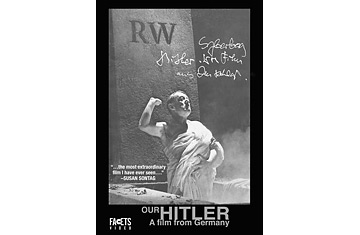
1979; Writer-director: Hans-Jurgen Syberberg
With Heinz Schubert, Peter Kern, Helmut Lange, Rainer von Artenfels, Harry Baer, Annette Syberberg
Facets Video
Available Dec. 11, List Price $79.95
Some critics are such passionate pitchmen for certain films that the works become theirs. Lola Montez was Andrew Sarris' darling, and Last Tango in Paris Pauline Kael's —she compared its U.S. premiere at the 1972 New York Film Festival to the first performance of Stavinsky's The Rite of Spring. Well, Francis Coppola may have attached the Our to the original title, Hitler: A Film from Germany, but this 6hr.50min. pageant is really Susan Sontag's. Once the distinguished essayist-novelist-filmmaker declared that Syberberg had made "the most extraordinary film I have ever seen," she owned it. And she wasn't the only critic moved to rapture when Coppola presented the movie in 1980 at New York's the Ziegfeld Theatre. Now, in a DVD edition supervised by the director, a new generation can see what all the kvelling was about.
Syberberg announces Hitler's scope in the film's subtitle, "From the Cosmic Ash-Tree to the Goethe Oak of Buchenwald": from the tree that, in Norse mythology, became the first man, to the one tree the S.S. left standing at their death camp, and which the prisoners named for the German philosopher who had often visited the area. The movie will see the rise and crimes of the Third Reich as a natural, pustulent expression of German history, myth and temperament.
It begins with a ringmaster strolling through a sound stage making this pitch: "Ladies and gentlemen! This show is about a man who is guilty of everything. An inhuman brute... a man who never laughed without putting his hand before his mouth, and who kicked his dog away if he was caught stroking the animal ... the man of the 20th century." It is every kind of movie and, as the ringmaster boasts, above every other kind. "This is no left-wing opportunist death-camp sex film," he says, though much time is spent on the sufferings of those beneath the Goethe oak. It is a free-form meditation, by a lively, roaming mind, on a figure who seized, like no other in the 20th century, our curiosity and revulsion.
The film's four feature-length episodes —"The Grail," "A German Dream," "The End of Winter's Tale" and "We Children of Hell" —mix long excerpts from speeches by Nazi leaders and comments by their victims with Syberberg's own musings on his nation's art and character as reflected and distorted by Hitler and his gang. The circus, vaudeville, puppet theater, symbolist and surrealist tableaux, audio and video newsclips, the whole arsenal of showbiz props is employed to keep the audience alert, instructed and entertained. Sontag said the movie "is as much about film as about Hitler," so you get a list of the films Hitler loved to watch, and a denunciation of the early Hollywood moguls who eviscerated the films of Erich von Stroheim, as well as testimony from the condemned in the camps.
Anyone, not just Sontag, could love Hitler for the scope of its intentions, the density of its images. "The film tries to be everything," she wrote. "Syberberg's unprecedented ambition in Hitler, a Film from Germany is on another scale from anything one has seen on film. It is work that demands a special kind of attention and partisanship; and invites being reflected upon, reseen. ... Syberberg's film belongs in the category of noble masterpieces which ask for fealty and can compel it. After seeing Hitler, a Film from Germany, there is Syberberg's film - and then there are the other films one admires. (Not too many these days, alas.)"
And even fewer these days. But it's unlikely that Hitler could win the devotion today that it received on its release. You had to be there —in the theater, submitting to an all-day immersion in Syberbergonomics. That way, Hitler could command you to follow its pace, its labyrinthine arguments and artistic strategies. Watching it on a TV screen, able to hit the Fast Forward or Stop button as your attention wanes, you are the director, the Fuehrer. Still, the cumulative experience —less than half the length of its TV-movie contemporary, Fassbinder's Berlin Alexanderplatz —is enthralling enough to invest in. Since the film is also viewable at Subterreanean Cinema, you're welcome to look at chunks there. If you're tantalized, then be a good consumer and buy the Facets video.